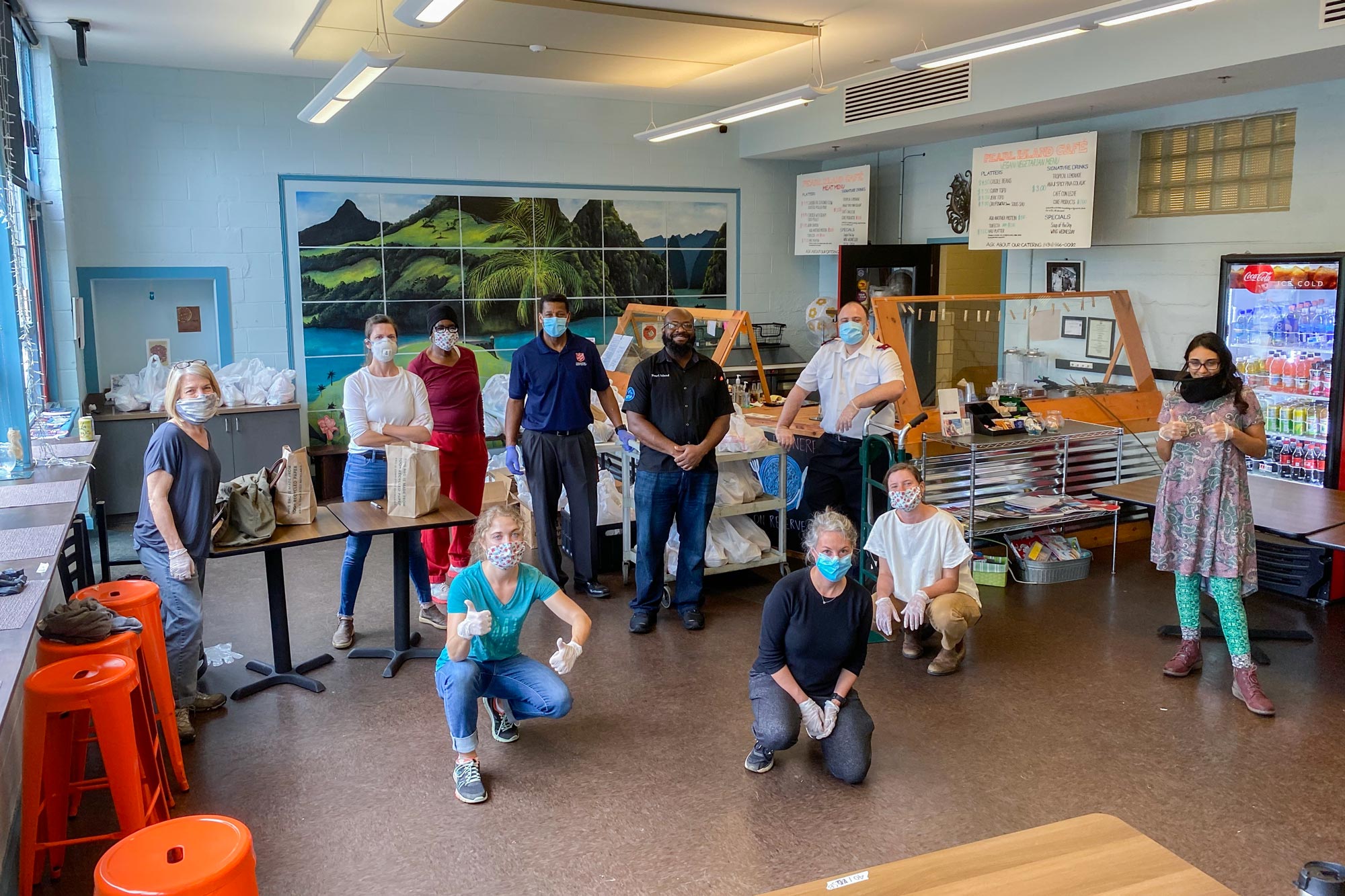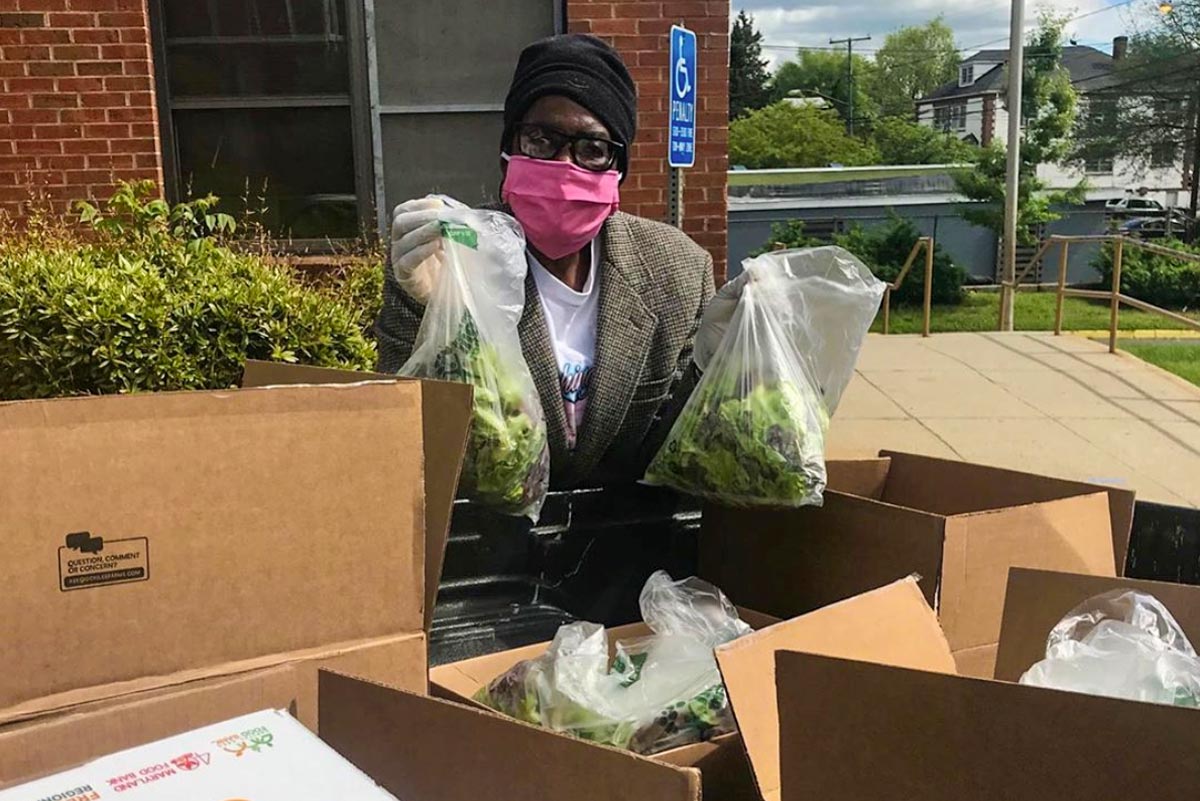Find the latest information on the University’s response to the coronavirus here.
Prior to the COVID-19 pandemic, approximately one in six people in the Charlottesville/Albemarle region faced food insecurity, unable to consistently access and afford healthy food.
Local leaders say the pandemic, which has led to a sharp increase in unemployment claims across the commonwealth and the country, is exacerbating existing problems, especially where systemic issues already existed.
“Nonprofits and grassroots groups in our network have seen an increase in demand for services, while they have also had to pivot to helping people shelter in place, often relying on volunteers and facing supply shortages,” Brooke Ray said. “Many of our community members were already struggling and are now facing even more acute concerns and, with new unemployment issues, others are emerging in need of support.”
An array of community organizations and leaders are working as hard as they can to help.
Ray, for example, is a member of the planning team for Cultivate Charlottesville’s Food Justice Network, a collective of more than 35 community organizations that have been working for racial equity, health and food security in Charlottesville. In the wake of the COVID-19 pandemic, the network is coordinating resources and partners to help ensure people who need food and resources most can continue to access them.
Ray is also the operations manager at the Global Policy Center in the University of Virginia’s Frank Batten School for Leadership and Public Policy, which, along with University organizations like the UVA Equity Center, is providing logistical and financial support to the Food Justice Network and other community groups, as well as elevating their message to University leaders.

Volunteers and partners from the Food Justice Network, City Schoolyard Garden, the Salvation Army, Pearl Island and the Batten School prepared spring break meals for Charlottesville students. (Photo: Aleen Carey)
Together, those organizations are meeting critical needs. The Loaves & Fishes food pantry, for example, offers much-needed groceries to families and individuals. City Schoolyard Garden, which partners with Charlottesville City Schools to teach gardening and nutrition skills, is now coordinating meal donations for students who rely on school lunches for regular meals. The PB&J Fund is providing more than 300 bagged meals each Friday to families, in partnership with Charlottesville City Schools. Local Food Hub, a nonprofit that partners with local farmers, is working to get fresh, locally grown produce into more neighborhoods, supporting farmers and residents at the same time.
For a full list of organizations serving the community during COVID-19 – and how you can help – visit the local resource site Support Cville and see the bulleted list below.
“There is a lot of great work going on right now, with a lot of different organizations pitching in,” Food Justice Network Program Director Shantell Bingham said. “My job is to check in with those organizations, and coordinate efforts and connect people so that we have the consistent impact we want to see, especially in the communities that need it most.”
Bingham, who earned both her undergraduate and Master of Public Health degree at UVA, has been working on food security issues in Charlottesville since she was an undergraduate, when she started a “Growing for Change” project partnering with public housing residents to build and plant gardens. That organization is now part of the Food Justice Network.
Right now, Bingham and other community leaders are particularly focused on making sure that pandemic-related relief efforts are equitable, reaching communities across Charlottesville and particularly those who are most vulnerable to the pandemic or underrepresented in other areas.
“Food insecurity was a persistent issue in Charlottesville before the pandemic, and the inequities we see in our food system are also very present in education, housing and economic wealth gaps, often founded in race or socioeconomic status,” Bingham said. “These are not new issues in Charlottesville and, as always, it is important to think about who controls resources, how they are distributed, and how nonprofits and leaders can share those resources in a way that fits what the community actually needs.”
The biggest part of that, Bingham said, is getting community members involved at every stage – something the Food Justice Network has prioritized for years.
“We have to set up programs that are driven by community members, and to get people who are living these issues day in and day out at the table, especially during the COVID-19 pandemic,” Bingham said. “We want to talk with people about what best meets their needs, and how we can set up food delivery, for example, to meet those needs.”
As part of that work, Bingham serves as a community director and local steering committee member at the UVA Equity Center, where she works with other local leaders, Equity Center staff and UVA faculty members to help identify concerns and coordinate responses.
“Our local partners are well-organized and dedicated, but COVID-19 has greatly increased the load they have to tackle,” Equity Center executive director Ben Allen said. “At the Equity Center, we can help to elevate their concerns, talk to University leaders and groups around UVA and in the community and identify areas that need support.”
The center employees a grant writer who is helping local organizations apply for pandemic-related grants and other funding. Staff members are also helping track food routes across the community, identifying which organizations are providing food and where it is going.
“That helps us see which areas of the community are not getting the food they need,” Allen said. “We want to keep that going and grow that working, during and after the pandemic, to keep giving families the support they need.”
It’s a mission that the Food Justice Network and the organizations it supports have been focused on for a long time – and one they will continue to pursue long after this pandemic. That is why, Ray said, supporting those organizations and mutual aid efforts is so important, and why the Global Policy Center is dedicating her time, plus that of two research assistants, to focus on this response.
“These organizations have been doing this work for a long time, and they are going to be here long after this response is over,” Ray said. “We want to invest in them, make sure they remain viable and able to support the community, and pursue much needed systems change in addition to critical emergency response work.”
How You Can Help:
- Continue to support local organizations working the community. Local resource site Support Cville has aggregated many of those organizations here.
- Support local organizations providing meals and groceries, including Loaves & Fishes Food Pantry, the Blue Ridge Area Food Bank, Local Food Hub and The PB&J Fund.
- Donate masks, cleaning supplies and other protective gear through Equip Cville, which is providing protective gear to frontline workers and staff distributing food or other aid.
- Support Cultivate Charlottesville, the umbrella organization overseeing the Food Justice Network and other organizations.
- Contact the UVA Employee Volunteer Center and they can help direct your time and expertise toward critical needs in the community
Media Contact
Article Information
May 6, 2020
/content/facing-spike-food-insecurity-local-organizations-band-together

